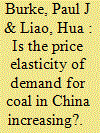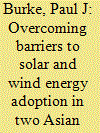| Srl | Item |
| 1 |
ID:
186427


|
|
|
|
|
| Summary/Abstract |
This paper uses household survey data from Australia to investigate whether renters face larger energy bills than otherwise similar households. We find that a negative unconditional effect of renting on residential electricity expenditure becomes positive when controlling for log net wealth, with renters on average spending about 8% more than otherwise similar households. This is a larger effect than in most prior studies. The effect operates via higher usage quantities rather than higher average prices, and a similar effect is found for overall residential energy expenditure including natural gas. Central to the story is that renters tend to have lower net wealth, and net wealth is associated with higher energy use due to reasons including additional appliance ownership. This makes net wealth an important control. The findings cast light on the potential for more ambitious policy responses to reduce energy-related disadvantages faced by renters in Australia. There is also scope for further research into whether similarly large effects are evident in other countries.
|
|
|
|
|
|
|
|
|
|
|
|
|
|
|
|
| 2 |
ID:
191114


|
|
|
|
|
| Summary/Abstract |
This paper reviews progress towards the establishment of an Association of Southeast Asian Nations (ASEAN) Power Grid (APG) and the key barriers to multilateral cross-border electricity trade in ASEAN. An analysis across political, technical, institutional, economic, environmental, social and time dimensions is employed. Using a policy sequencing framework, the paper concludes it remains premature for ASEAN to pursue a strong form of power sector market integration on account of the sizeable barriers that currently remain, especially economic and institutional barriers. Focusing on bilateral power purchase agreements and large-scale investments in solar and wind power over 2022–2030 would help to develop stronger foundations for ASEAN to make steps towards deeper regional integration in the electricity sector in subsequent years, while also being consistent with renewables adoption goals.
|
|
|
|
|
|
|
|
|
|
|
|
|
|
|
|
| 3 |
ID:
143377


|
|
|
|
|
| Summary/Abstract |
China's dependence on coal is a major contributor to local and global environmental problems. In this paper we estimate the price elasticity of demand for coal in China using a panel of province-level data for 1998–2012. We find that provincial coal demand has become increasingly price elastic. As of 2012 we estimate that this elasticity was in the range − 0.3 to − 0.7 in point estimate terms when responses over two years are considered. The results imply that China's coal market is becoming more suited to price-based approaches to reducing emissions. The elimination of coal consumption subsidies could reduce national coal use and related emissions by around 2%.
|
|
|
|
|
|
|
|
|
|
|
|
|
|
|
|
| 4 |
ID:
167019


|
|
|
|
|
| Summary/Abstract |
Solar and wind electricity generation technologies have become cost competitive and account for a growing share of global investment in new electricity generation capacity. Both India and Indonesia have ambitious targets for adoption of these technologies, and India has an impressive current rate of uptake. Substantial obstacles exist, however, including the entrenched positions of coal and other fossil fuels, regulatory barriers to market access, and weak abilities of electricity utilities to manage intermittent renewables. This paper reviews these obstacles and discusses strategies to overcome them. We focus on the use of reverse auction processes able to deliver low-price solar and wind contracts, as are being successfully employed in India, on tax and subsidy reform options, on regulatory and incentive-design strategies, on approaches to bolster grid management capacities, and on the importance of minimizing protectionist barriers. Our analysis covers both small-scale and large-scale systems.
|
|
|
|
|
|
|
|
|
|
|
|
|
|
|
|